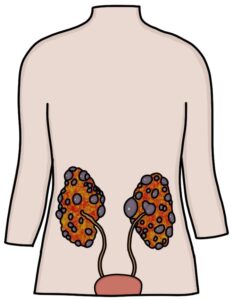Polycystic kidney disease is a genetic condition where the healthy kidney tissue is replaced with many fluid-filled cysts. The enlarged kidneys may be palpable on examination of the abdomen. It leads to renal failure.

There is an autosomal dominant and an autosomal recessive type. The autosomal dominant type is more common.
Autosomal Dominant Polycystic Kidney Disease
The affected genes in autosomal dominant polycystic kidney disease (ADPKD) are:
- PKD1 gene on chromosome 16 (85% of cases)
- PKD2 gene on chromosome 4 (15% of cases)
Extra-renal manifestations include:
- Cerebral aneurysms
- Hepatic, splenic, pancreatic, ovarian and prostatic cysts
- Mitral regurgitation
- Colonic diverticula
Complications include:
- Chronic loin/flank pain
- Hypertension
- Gross haematuria can occur with cyst rupture (usually resolves within a few days)
- Recurrent urinary tract infections
- Renal stones
- End-stage renal failure occurs at a mean age of 50 years
Autosomal Recessive Polycystic Kidney Disease
Autosomal recessive polycystic kidney disease (ARPKD) is caused by a mutation in the polycystic kidney and hepatic disease 1 (PKHD1) gene on chromosome 6. It is more rare and severe than ADPKD. It is often picked up on antenatal scans with oligohydramnios (reduced amniotic fluid volume due to reduced urine output).
Oligohydramnios leads to underdevelopment of the fetal lungs (pulmonary hypoplasia) and respiratory failure shortly after birth. Patients may require haemodialysis within the first few days of life. They may have dysmorphic features, such as underdeveloped ear cartilage, low-set ears and a flat nasal bridge. End-stage renal failure usually occurs before reaching adulthood.
Management
Ultrasound and genetic testing are used for diagnosis.
Tolvaptan (a vasopressin receptor antagonist) can slow the development of cysts and the progression of renal failure in autosomal dominant polycystic kidney disease. This requires specific criteria and specialist monitoring.
Management may involve:
- Antihypertensives for hypertension (e.g., ACE inhibitors)
- Analgesia for acute pain
- Antibiotics for infections (e.g., UTIs or cyst infections)
- Drainage of symptomatic can be performed by aspiration or surgery
- Dialysis for end-stage renal failure
- Renal transplant for end-stage renal failure
Other management steps include:
- Genetic counselling
- Avoiding contact sports due to the risk of cyst rupture
- Avoiding NSAIDs and anticoagulants
- MR angiography (MRA) can be used to screen for cerebral aneurysms
Last updated September 2023
Now, head over to members.zerotofinals.com and test your knowledge of this content. Testing yourself helps identify what you missed and strengthens your understanding and retention.

